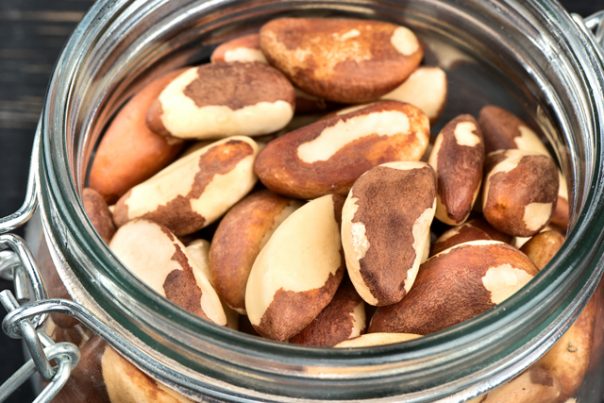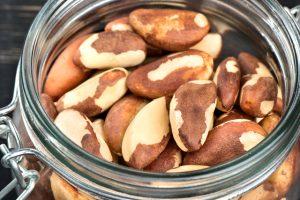- Biotin
- Calcium
- Cellulose
- Choline
- Chromium
- Copper
- Folate
- Iodine
- Iron
- Lignin
- Magnesium
- Manganese
- Omega-6 fatty acids
- Phosphorus
- Potassium
- Riboflavin
- Selenium
- Thiamine
- Vitamin A
- Vitamin B1
- Vitamin B3
- Vitamin B5
- Vitamin B6
- Vitamin C
- Vitamin E
- Zinc
Brazil Nuts – sources, health benefits, nutrients, uses and constituents at NaturalPedia.com
Wednesday, June 21, 2017 by Russel Davis
http://www.naturalpedia.com/brazil-nuts-sources-health-benefits-nutrients-uses-and-constituents-at-naturalpedia-com.html

Brazil nuts are healthy tree nuts and are regarded as superfoods due to their high nutritional value. The trees, which bear the same name, are native to South American countries including Brazil, Venezuela, Colombia, and Peru.
List of known nutrients
Like other tree nuts, Brazil nuts are packed with essential vitamins and minerals that provide a plethora of health benefits. Nutrients found in Brazil nuts include:
Medicinal uses for Brazil nuts
Just like other healthy tree nuts, Brazil nuts are known to promote a healthy cardiovascular profile. Brazil nuts are packed with calcium, magnesium, and potassium –nutrients that regulate blood pressure levels. The tree nut is also rich in selenium, which eliminates fat deposits in cardiovascular membranes and prevents the onset of blood clots. Brazil nuts are also an excellent source of omega-3 fatty acids that reduce cholesterol levels in the body. Brazil nuts are also loaded with potent antioxidants that stave off diseases. In addition, the tree nuts contain high levels of monounsaturated and polyunsaturated fats that reduce the risk of heart disease.
Brazil nuts’ rich selenium content is also associated with lower odds of developing certain types of cancers such as prostate, colon, stomach, lung, and breast cancers. The high selenium content in Brazil nuts are also known to improve male fertility. In addition, Brazil nuts’ rich selenium levels stimulate the production of active thyroid hormones that are beneficial for people with low thyroid function.
Brazil nuts are also packed with powerful antioxidants that promote skin elasticity and prevent drying. Brazil nuts’ high zinc contain is also touted for preventing certain skin conditions such as eczema and psoriasis. Brazil nuts are known to ease cracked feet and heals, and ease painful tightness and itching. While Brazil nuts are high in fat, their healthy fat content are shown to prevent the onset of excessive weight gain. Brazil nuts are also found to stave off hunger pangs. The tree nut’s high copper content is also found to accelerate tissue build up and cell energy generation.
The tree nut is also high in thiamine, which are essential in maintaining brain health. Thiamine is proven to keep cognitive conditions such as Alzheimer’s disease at bay. This makes Brazil nut consumption essential for brain health.
Body systems supported by Brazil nuts
With their numerous health benefits, Brazil nuts are perhaps among the world’s best superfoods. The tree nut is especially beneficial for the heart due to its cholesterol- and blood pressure-lowering properties. The tree nuts are also touted for its positive effects on the thyroid glands. Brazil nuts also benefit the digestive system by preventing potential weight gain. Brazil nuts are also known to benefit the skin, the brain, and the male reproductive system.
Ways to use Brazil nuts
Brazil nuts produce essential oils that can be used as an emollient and massage oil. Brazil nuts can be consumed alone of roasted, sweetened or salted. The tree nuts are also a staple in making baked goods and desserts. Brazil nuts can be added to salads, soups, and even in pasta as a pesto substitute.
Where to learn more
- Eating Just Two Brazil Nuts a Day Ensures Adequate Selenium Levels
- 5 Reasons Men Should Eat Brazil Nuts
- Bad Acne Home Remedy: How to Get Rid of Acne with Brazil Nuts?
- Six little-known natural remedies for tinnitus
- 4 Great Nuts That Support Your Liver Health
Summary
Brazil nuts prevent heart disease, cancer, Alzheimer’s disease, and certain skin conditions
Brazil nuts benefit the heart, the thyroid glands and the skin.
The tree nut also benefits the brain, the digestive system, and the male reproductive system.
Brazil oil is used for cooking.
Brazil nuts are an average antioxidant.
Sources include:
Tagged Under: Tags: Brazil nuts







